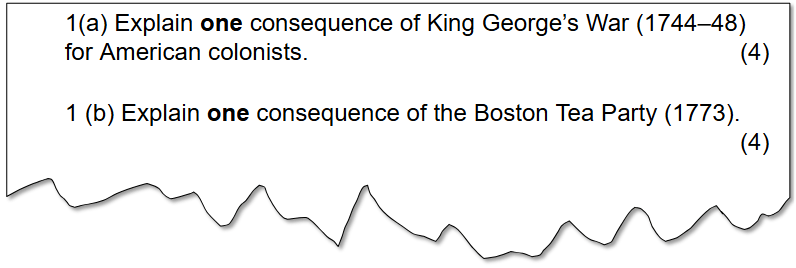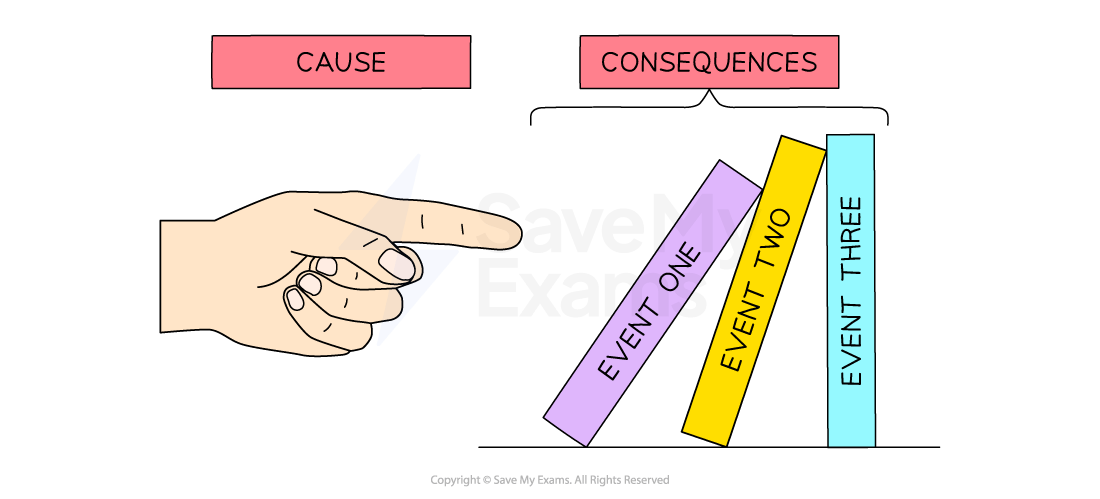The 4 Mark "Explain One Consequence of" Question (Edexcel GCSE History): Revision Note
Exam code: 1HI0
Summary of Question 1
Question 1 requires you to explain one consequence of a historical event
This question has changed format since 2024
Previously, you were asked to explain two consequences of one event
Now, you have to explain one consequence of two given events, separated into Question 1 (a) and Question 1 (b)
Amount of marks | 8 (2×4 marks) |
|---|---|
The time that you should spend on the question | No more than 10 minutes |
An example of the type of question you may encounter can be seen below:

In previous years, this question has focused on the following topics for British America, 1713–83:
Year of exam | Question topic |
|---|---|
2018 | The War of Independence for Native Americans (opens in a new tab) |
2019 | The Piracy Act (1717) (opens in a new tab) |
2020 | The Proclamation Act of 1763 (opens in a new tab) |
2021 | No paper available |
2022 | The Stono Rebellion (1739) (opens in a new tab) |
2023 | The Enlightenment for British America (opens in a new tab) |
2024 | The War of Independence for Loyalists |
How to explain consequences
Cause and consequence is a second-order concept
Causes and consequences are like falling dominoes
The causes are what push the dominoes over
For the example question, one cause of the Boston Tea Party was the Tea Act (1773)
The consequences are the other dominoes that fall
For the example question, one consequence of the Boston Tea Party was a decline in relations between Britain and American colonists

Consequence
A consequence in history is something that has happened in response to a cause
Consequences can be:
Different depending on the person
For example, the consequences of the Boston Tea Party on American colonists were different from the consequences for the British government
Short- or long-term
Both positive and negative
Use causation connectives, such as:
"Due to ..."
"As a result ..."
"Consequently ..."
"Explain one consequence of" question structure
Your answer should consist of:
Specific and relevant knowledge
A developed and well-explained consequence of the event or issue
Your answers could be written in PEE paragraphs:
P — Make a point by writing a consequence of the event in the question
E — Include evidence to support the point you have made (K)
Focus on key knowledge about the event in the question
E — Explain the question (SOC)
Focus on the key demands of the question
Include a complex explanation that shows your understanding of cause and consequence
To achieve full marks, you need to answer both Questions 1 (a) and 1 (b). The questions are on two different events
Each consequence question is worth 4 marks
2 marks for knowledge (K)
2 marks for your analysis of the second-order concept of the consequence (SOC)
8 marks are available for answering both parts of Question 1
Worked example of an "Explain one consequence of" question
Worked Example
1 (a) Explain one consequence of King George’s War (1744–48) for American colonists.
(4)
Answer:
One consequence of King George’s War was the growing frustration among New England colonists at British decision-making (SOC). During the war, colonial soldiers helped capture the French fortress of Louisbourg in 1745, which was seen as a great success (K). However, in the 1748 Treaty of Aix-la-Chapelle, Britain gave Louisbourg back to France in exchange for territory elsewhere (K). This upset many colonists who felt their sacrifices were being ignored by Britain, which increased tensions and weakened colonial loyalty (SOC).

Unlock more, it's free!
Was this revision note helpful?